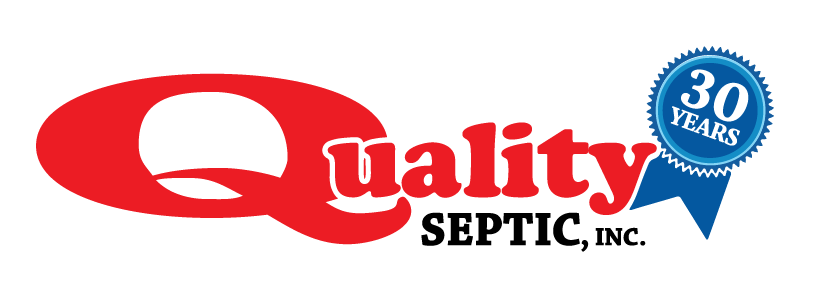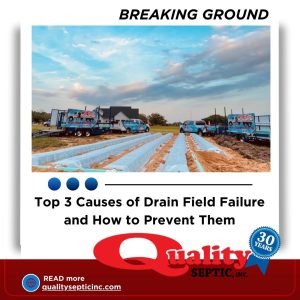Your septic system’s drain field has an important role! It treats and disperses wastewater from your home, and this is a big job. Because of that, it can also be one of the most vulnerable components of your septic system. When a drain field fails, it can lead to costly repairs, unpleasant odors, and even environmental contamination. To help you avoid these issues, let’s explore the top three causes of drain field failure and how to prevent them.
1. Clogs from Improper Waste Disposal
Improper waste disposal is one of the leading causes of drain field clogs. Flushing non-biodegradable materials can obstruct the flow of wastewater throughout your septic tank, leading to backups and system failure.
Common Culprits:
- Flushing wipes, diapers, or feminine hygiene products.
- Pouring grease, oil, or other types of fats down the drain.
- Overusing garbage disposals, which can add excessive solids to the tank.
How to Prevent Clogs:
- Flush Only What’s Necessary: Stick to flushing only toilet paper and human waste. Even products labeled as “flushable” can cause problems.
- Dispose of Grease Properly: Pour cooking oils and grease into a container and throw it in the trash instead of washing it down the sink.
- Use Drain Strainers: These simple tools can catch hair, food particles, and debris, keeping them out of your septic system.
2. Oversaturated Soil from Excessive Water Use
Your drain field relies on surrounding soil to absorb and treat wastewater. When too much water enters the system, the soil can become oversaturated, preventing proper filtration. Oversaturation can lead to backups in your home and pooling water in your yard.
Causes of Excessive Water Use:
- Running multiple water-heavy appliances simultaneously.
- Leaking faucets or plumbing fixtures.
- Rainwater draining into the drain field area.
How to Prevent Oversaturation:
- Conserve Water: Spread out laundry loads, try to take shorter showers, and fix leaks promptly. Installing water-efficient fixtures can also reduce your water usage.
- Divert Rainwater: Ensure gutters and downspouts direct rainwater away from your drain field.
- Install a Distribution Box: This component helps evenly distribute wastewater throughout the drain field, preventing one area from becoming oversaturated.
3. Soil Compaction and Root Intrusion
Soil compaction and invasive roots can damage the pipes and soil structure of your drain field. Compacted soil reduces the system’s ability to absorb and filter waste, while roots can grow into the pipes, causing blockages or leaks.
Common Causes of Soil Compaction and Root Issues:
- Driving or parking heavy vehicles over the drain field.
- Planting trees or shrubs too close to the system.
How to Prevent Soil Compaction and Root Intrusion:
- Protect the Drain Field Area: Avoid parking vehicles, building structures, or storing heavy equipment on top of the drain field.
- Plant Wisely: Keep trees and shrubs at least 20-30 feet away from the drain field. Choose plants with shallow roots to minimize the risk of intrusion.
- Inspect Regularly: Have a professional check for early signs of root intrusion and address issues before they escalate.
Recognizing the Signs of Drain Field Failure
Even with proper care, it’s important to recognize the warning signs of a failing drain field. Early detection can save you from major repairs.
Common Symptoms of Drain Field Problems:
- Persistent wet spots or pooling water in the drain field area.
- Sewage odors around your property.
- Slow drains or gurgling sounds in your plumbing.
- Backups of wastewater into sinks, tubs, or toilets.
If you notice any of these signs, contact a professional septic service provider such as Quality Septic Inc. immediately.
Keeping Your Drain Field Healthy
Preventing drain field failure starts with understanding how your septic system works and taking proactive measures to maintain it. By disposing of waste properly, conserving water, and protecting your drain field from damage, you can extend the lifespan of your system and avoid unnecessary headaches. When in doubt, consult a professional like Quality Septic Inc.

